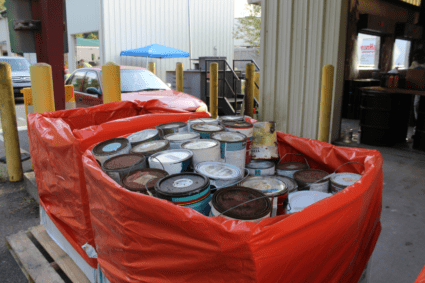Household Hazardous Waste (HHW)
 Household Hazardous Waste (HHW) is material that must be handled and disposed of properly due to dangers it poses to our health and the environment. The Tompkins County Department of Recycling and Materials Management (TCRMM) offers a permanent location to accept HHW from Tompkins County residents and qualified businesses and organizations that are Conditionally Exempt Small Quantity Generators (CESQG).
Household Hazardous Waste (HHW) is material that must be handled and disposed of properly due to dangers it poses to our health and the environment. The Tompkins County Department of Recycling and Materials Management (TCRMM) offers a permanent location to accept HHW from Tompkins County residents and qualified businesses and organizations that are Conditionally Exempt Small Quantity Generators (CESQG).
2024 HHW Drop-off Events:
Residents must have a valid permit and an appointment to attend an event.
Click an event listed above to create an appointment. You will need your solid waste permit number. Only one sign-up per household per Drop Off event.
*Businesses and other non-residential source CESQGs: Click here for more instructions.
*Certified applicators of agricultural pesticides and chemicals, including farms, cemeteries, golf courses, marinas, schools, landscapers and lawncare providers, nurseries, and greenhouses, should refer to CleanSweepNY for waste collection events.
Accepted HHW:
TCRMM accepts most hazardous products that are Corrosive, Ignitable, Poisonous, Reactive, or Toxic, including:
- Automotive care products
- Damaged Lithium batteries
- Fluorescent light bulbs and tubes (may also be accepted at your local hardware store, call ahead first)
- Home maintenance products
- Lawn & garden products
- Oil-based paints & stains (latex and water-based paint accepted if more than 1/3 of a gallon per container)
- Personal care products
- Products containing mercury
- Unidentified products – The County’s hazardous waste contractor will test them while you wait, to determine the identity of the waste, as well as its acceptability
- Workshop/hobby wastes
Not Accepted HHW:
Please contact our office for guidelines on how to properly manage these products:
- Ammunition, explosives, and firearms
- Asbestos
- Batteries (dispose of alkaline batteries in trash, rechargeable batteries can be brought to the electronics drop off area)
- Controlled substances (ie. barbiturates, or other prescription or non-prescription medication)**For free safe disposal of pharmaceuticals, visit healthyyouth.org**
- Empty containers
- Propane tanks and other gas cylinders – Empty aerosol and propane tanks can be recycled at the Recycling and Solid Waste Center
- Medical or infectious waste – including syringes, needles, or other sharps
- Smoke detectors (dispose of as trash)
- Radioactive waste
How to Prepare HHW to Bring to a Drop Off Event:
- Lay down a plastic sheet the under area where hazardous containers will be handled.
- Keep HHW away from children, pets, sources of water and flame, and never smoke around HHW.
- Keep all products in their original, labeled containers.
- Label unidentified products “unknown”.
- NEVER MIX CHEMICALS TOGETHER.
- Carefully place items that are in leaking or rusty containers in newspaper and place inside a plastic bag or larger non-returnable container with absorbent material, such as kitty litter.
- DO NOT leave valuables or other belongings in your trunk that you do not want removed.
Drop Off Event/Onsite Instructions:
- For your safety, smoking is not permitted at the RSWC
- For your safety, please stay in your car. You may be asked to push a trunk release button or provide keys to staff to allow access to trunks or hatchbacks.
- There may be a brief wait while your materials are checked for acceptability.
- Be prepared to wait in line, depending on the volume of material brought by others.
- Once your waste has been removed, signs will direct you to the facility exit. All traffic is one-way.
- Face coverings must be worn at this event and at all times at the Recycling and Solid Waste Center.
- Additional materials can be brought to the electronics drop off area during normal operating hours.
Disclaimer: These suggestions advise safe disposal of products using the best technology available at the present time. TCRMM assumes no liability for the effectiveness or the results of the procedures described on this website. Recycling of hazardous waste is the recommended disposal method for all household hazardous wastes.
